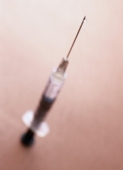GLP-1 receptors appear to change brain’s response to food, researchers say
TUESDAY, June 9, 2015 (HealthDay News) — GLP-1 receptor agonists may help reduce cravings and increase satisfaction while eating, according to research scheduled to be presented Tuesday at the annual meeting of the American Diabetes Association, held from June 5 to 9 in Boston.
Liselotte van Bloemendaal, M.D., a Ph.D. student at the Diabetes Center, VU University Medical Center in Amsterdam, and colleagues looked specifically at the injectable GLP-1 receptor agonist exenatide (Bydureon, Byetta). “Using functional magnetic resonance imaging, we looked at the reward centers in the brains of obese individuals with and without type 2 diabetes and measured the response to the anticipation of and drinking of chocolate milk while being given GLP-1 receptor agonist intravenously versus placebo,” van Bloemendaal said in an American Diabetes Association news release.
“We found that GLP-1 receptor activation decreased anticipatory food reward, which may reduce cravings, and increased the feeling of food reward during consumption, which may reduce overeating,” van Bloemendaal added. The findings may lead to new treatments for obesity, she said.
One avenue that merits further investigation, according to Van Bloemendaal, is whether addition of a second hormone, such as glucagon, could increase weight loss. Van Bloemendaal also wants to determine whether these therapies can reduce cravings for drugs, alcohol, and nicotine.
Copyright © 2015 HealthDay. All rights reserved.








